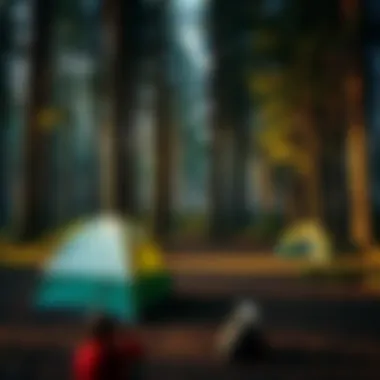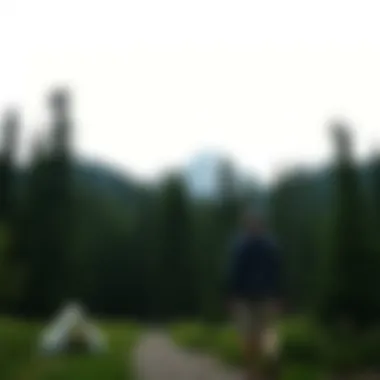Washington State Camp Reservations: A Complete Guide


Intro
When it comes to camping in Washington State, planning is often the key to a memorable outdoor experience. With lush forests, majestic mountains, and scenic lakes, the Evergreen State offers a plethora of camping opportunities. From the casual weekend camper to the seasoned adventurer, understanding the intricate process of camp reservations can enhance your journey into nature.
In this guide, we’ll navigate through the essential aspects of making a reservation, outlining the procedures and regulations in place. We’ll also shine a light on the different reservation systems you’ll encounter. Options will span from state parks to private campgrounds, giving everyone a taste of the splendid outdoors . Understanding what influences your camping choices—be it location, amenities, or site availability—is paramount. Add to that the natural beauty of Washington’s landscapes, and you’ve set the stage for a remarkable retreat.
Lastly, we’ll share tips to maximize your camping experience and provide insight into invaluable resources that cater to camping needs. It's not just about booking a spot; it’s about immersing yourself in the serene embrace of nature. Let's dive in and uncover the nuances of securing your reservations for a successful camping expedition.
Preamble to Camp Reservations in Washington State
Camping in Washington State is not merely a pastime; it is a profound engagement with nature's artwork that encompasses mighty mountains, lush forests, and pristine lakes. Understanding how camp reservations fit into this experience is essential for both novice and seasoned campers. With the right reservation in hand, one can truly lay the groundwork for a rewarding adventure. This article explores various aspects of reservations, guiding readers through processes and considerations that can make their camping trip seamless and enjoyable.
Understanding the Importance of Reservations
Reservations are akin to the bedrock of a successful camping trip. They provide assurance where uncertainty can reign. Imagine driving hours to one of Washington's captivating state parks, only to find out there's no spot for you due to the influx of fellow outdoor enthusiasts. A well-planned reservation ensures that your campsite awaits your arrival, sparing you from the disappointment of a full campground.
It's not just about securing a spot. Reservations help campground managers maintain a balanced ecosystem by controlling occupancy and preserving the natural environment. For visitors, it offers convenience—planning ahead can assist in selecting appropriate times and locations that suit your needs, especially during the bustling summer months.
More so, being mindful about reservations can lead to discovering lesser-known gems in Washington’s vast outdoor portfolio. It’s vital for hikers, weekend warriors, or even families looking for a peaceful escape amidst the hustle of daily life.
Overview of Camping Trends in Washington
The camping landscape in Washington State is dynamic, evolving with the changing seasons and societal trends. Recent surveys indicate a marked increase in outdoor activities, particularly among younger crowds eager to head out into nature. With social media fueling interest, Washington's breathtaking camping locations have become buzzworthy hotspots, making it significantly more competitive to secure desirable sites.
- Rise in Family Camping: More families have embraced camping as a way to bond, bringing together the natural world with quality time away from screens.
- Emphasis on Sustainability: There’s a growing awareness around eco-friendly practices among campers, encouraging the use of sustainable materials and minimizing the environmental footprint while enjoying the great outdoors.
- Incorporation of Technology: From apps that help find the perfect camping site to digital platforms for reserving spots, technology plays a vital role in enhancing the camping experience. While the age-old simplicity of camping endures, embracing these tools allows for better planning and, thus, a more enjoyable experience outdoors.
These trends underscore the significance of becoming adept at navigating the varied landscapes of camp reservations. Each change in camper behavior influences what one might encounter while booking—whether that be the advantage of online reservations or considering group sizes when planning trips.
"Camping in Washington provides an unmatched opportunity to connect with nature, but reserving your space ahead of time is crucial to safeguard that adventure."
In summary, understanding camp reservations in Washington State sets the stage for enriching outdoor experiences, enabling adventurers to dive into pristine nature without worry. As we unravel this guide, you will find footpaths leading to essential insights on campground types, reservation procedures, and invaluable camping tips that complement your journey in the Evergreen State.
Types of Campgrounds in Washington State
Camping in Washington State offers a distinctive experience due to the variety of campgrounds available. Understanding the types of campgrounds can be significant for choosing the right spot for your next adventure. Each type has its own unique charm and set of guidelines, attracting both casual visitors and dedicated outdoor lovers. The choice of campground can influence not only your comfort but also your access to recreational activities and natural wonders. Let’s dive into the diverse campgrounds Washington State has on offer.
State Parks and Their Offerings
State parks in Washington are a treasure trove for nature enthusiasts. These parks are designed to protect unique ecosystems while providing visitors with amenities for a comfortable stay.
Often, state parks like Deception Pass State Park or Cape Disappointment State Park offer vast landscapes ranging from rugged coastlines to lush forests. In these parks, camping facilities can vary from primitive sites with just a picnic table and fire ring to fully developed campgrounds with flush toilets and showers.
One of the key benefits of camping in state parks is the proximity to numerous recreational activities. You can hike, bike, swim, or fish, often just a few steps from your tent. Just keep in mind that reservations can fill up quickly during peak seasons, especially when the weather shines.
National Forests and Recreation Areas


Washington is home to several national forests, such as the Olympic National Forest and Gifford Pinchot National Forest, where the camping experience tends to be more rugged and primitive. You might find a variety of sites, from well-maintained campgrounds to more dispersed camping options where you can set up your tent in a secluded spot in the woods. Camping here often means embracing the wild atmosphere, with natural sounds and sights all around.
When camping in national forests, bear in mind that some areas are more regulated than others. Certain spots might require permits, particularly for activities like backcountry camping or gathering firewood. Thus, doing your homework beforehand is advisable.
Private Campgrounds: Pros and Cons
Private campgrounds present a different flavor of camping and come with their own distinct set of benefits and drawbacks. For example, campgrounds like Lake Pleasant or Snoqualmie Falls might offer a more controlled environment with amenities such as Wi-Fi, laundry facilities, and well-maintained restrooms.
On the flip side, the cost can be a factor. Staying in private campgrounds might pinch the pocket a bit more when compared to state or national parks. Moreover, some might find that a more commercial atmosphere can detract from the overall wilderness experience.
Here’s a quick breakdown:
- Pros:
- Cons:
- Facilities and amenities for added comfort.
- Reservation processes can often be straightforward.
- Family-friendly, with activities for children.
- Often more expensive.
- Can be crowded, especially during peak summer months.
- May lack the immersion into nature compared to more remote sites.
Ultimately, the choice of campground hinges on personal preferences and the kind of experience one wishes to have. With its diverse offerings, Washington State faithfully caters to a variety of camping styles and preferences.
Navigating the Reservation Processes
Understanding how to navigate the reservation processes is crucial for anyone looking to camp in Washington State. The process can feel overwhelming, especially for beginners, but knowing the ins and outs can significantly enhance your outdoor experience. From online bookings to phone calls, each method has its perks and considerations. Understanding these will empower you to make informed choices that align with your camping preferences.
Online Reservation Systems Explained
In today’s digital age, online reservation systems have revolutionized how campers secure their spots. Most campgrounds in Washington utilize user-friendly platforms, making it relatively simple to browse options, compare amenities, and make reservations with just a few clicks. Websites like ReserveAmerica.com and Washington State Parks' official site often present an interactive interface where you can view real-time availability.
Key features of online systems include:
- 24/7 Access: You can book anytime without worrying about business hours.
- Instant Confirmation: Once you complete your reservation, you receive immediate verification, eliminating the anxiety of waiting.
- Filters and Search Tools: You can narrow down your options based on factors like location, amenities, and accessibility.
However, it pays to plan ahead. Popular sites can book up quick, particularly from late spring to early fall. If you have a specific park or campground in mind, check its reservation opening dates and try to book as soon as possible.
Phone Reservations: When and How to Use
While online reservations have their advantages, some campers may prefer the personal touch of a phone call. This traditional method is still available and can be particularly useful in specific situations. For instance, if you have special requests, need to clarify policies, or prefer to speak with a live person, don’t hesitate to pick up the phone.
Practical Tips for Phone Reservations:
- Identify the Right Number: Each campground typically has a dedicated reservation line, so make sure you’re calling the right place. Check the official website for accurate contact information.
- Prepare Your Information: Keep a list of your preferred dates, group size, and any specific requests handy when you call.
- Be Patient and Polite: During peak seasons, wait times might be longer, so it’s a good idea to remain patient as staff help you.
A quick note: Phone reservations might not show real-time availability, unlike online systems. Double-check any details before concluding your reservation to avoid surprises.
Walk Up Reservations: What to Expect
While it’s often wise to book ahead, some campers thrive on spontaneity and prefer walk-up reservations. This method can offer a sense of adventure, albeit with a few caveats.


First off, availability can be hit-or-miss. Many sites reserve a portion of their spots for walk-up campers, but during peak seasons, it may be challenging to secure a site without prior arrangements.
Considerations for Walk-Up Reservations:
- Arrive Early: The earlier you arrive, the better your chances. Aim to be at the park when it opens to snag a spot.
- Know the Campground Rules: Some sites might have specific hours for check-ins and check-outs. Familiarize yourself with these details to avoid any hassle.
- Be Flexible: You might not get your first choice, but being open to different sites may lead you to an unexpected gem of a camping spot.
Overall, whether you choose to reserve online, make a phone call, or show up in person, understanding these processes can help smooth the path to your outdoor adventure. Now that you’ve got the lowdown on reservations, you’re one step closer to experiencing the scenic beauty of Washington’s campgrounds.
"The great outdoors are within reach, but planning is the key to unlocking your adventure."
For further information on reservation systems, you can refer to Washington State Parks: parks.wa.gov and the managing authority for Washington’s national forests: fs.usda.gov.
Key Factors Influencing Your Camp Reservation
When planning a camping trip in Washington State, several key factors can heavily influence your choice of reservation and ultimately your overall experience. Understanding these aspects not only ensures that your outdoor adventure is enjoyable but also aligns your expectations with the realities of camping in various environments. Below, we will delve into the crucial elements that should guide your decisions:
Seasonal Considerations
Washington State boasts a diverse climate that can dramatically affect camping conditions through the calendar year. The peak camping season typically falls between late spring and early fall, where sunny days and warm temperatures draw large crowds to campgrounds. However, attributes like temperature fluctuations, potential rainfall, and even snowfall can vary — particularly in mountainous regions.
For instance, coastal camping on the Olympic Peninsula can be a different ballgame compared to the dry heat of eastern Washington. Planning your reservations around local weather patterns can save you from unexpected inconveniences. Remember to consider:
- Peak Seasons: High traffic areas may be booked out months in advance; spring and early summer can be ideal for reserving family sites while avoiding crowds.
- Weather Variability: Accidentally planning a trip during the rainy season can limit outdoor activities or lead to muddy campsites.
- Wildlife Safeguards: Some areas may have seasonal restrictions due to wildlife activity, especially around breeding seasons for bears or other animals.
Group Sizes and Types of Camping
Every camper has different needs, which means group size and type of camping play crucial roles in reservation decisions. Whether it's a solo adventure, a couple's retreat, or a family gathering, each group will require distinct considerations.
Larger groups might find it challenging to secure group campsites, especially during weekends and holidays. On the other hand, solo campers often benefit from increased site availability.
- Group Campsites: Some campgrounds offer dedicated spaces that accommodate larger parties, often requiring advance booking. Be aware of specific rules regarding number limits and shared facilities.
- RV vs. Tent Camping: If you're traveling with an RV, check for sites with electrical hookups and water access. Tent campers should look for secluded spots with adequate ground cover and shade.
- Backpacking vs. Car Camping: If you're planning to hike out to your site, consider weight limits for gear. For car camping, packing heavier might be feasible, allowing for a more comfortable experience.
Accessibility and Amenities
Access to campsites and available amenities are pivotal in enhancing the camping experience. This isn't only about physical accessibility but also includes the facilities offered by the campgrounds.
- Accessibility: Ensure you check if campgrounds are accessible for various mobility needs. Certain parks provide ADA-compliant facilities, which can notably improve satisfaction for individuals with disabilities or families with young children.
- Amenities like Showers and Wireless Access: Some campers might look for restrooms, hot showers, or even Wi-Fi access, while others prefer a more primitive experience. Understanding what’s available at your chosen site can shape your reservations.
- Proximity to Recreation Areas: If you plan to hike, fish, or enjoy water sports, select sites close to those attractions. This can minimize travel time and maximize your fun in the great outdoors.
By considering these factors, you can tailor your camping experience to fit your preferences and needs. A thoughtful and informed approach will lead to a memorable adventure in the gorgeous landscapes of Washington State.
Always check official resources and local regulations for the latest information on campground amenities and restrictions, such as from the Washington State Parks website (https://parks.state.wa.us) or the U.S. Forest Service (https://www.fs.usda.gov). Keeping abreast of evolving conditions will allow you to make well-informed reservations.
Making the Most of Your Camping Experience
Making the most out of your camping adventure in Washington State is not just about finding the perfect spot and packing your bags. It’s about digging deeper into the elements that enrich your time spent outdoors. By focusing on essential practices, safety measures, and a strong respect for nature, campers can turn their ordinary trips into memorable experiences. Understanding these aspects not only enhances your enjoyment but also contributes to the preservation of Washington’s stunning landscapes.


Packing Essentials: A Comprehensive Checklist
Packing the right gear can make or break a camping trip. Whether you are camping in a state park or a remote national forest, having a comprehensive checklist is vital. Here’s a breakdown of essential items to consider:
- Shelter: Tent, stakes, and a ground tarp.
- Sleeping Gear: Sleeping bag rated for the season, sleeping pad, and a pillow.
- Clothes: Weather-appropriate layers, waterproof jacket, and extra pairs of socks.
- Cooking Supplies: Portable stove, cooking pot, utensils, and cleaning supplies.
- Food and Water: Non-perishable food items, snacks, and a reliable water filtration system.
- Safety Gear: First-aid kit, maps, compass, and a multi-tool.
- Lighting: Lanterns, flashlights, and extra batteries.
It’s prudent to customize this list according to personal preferences and the specific conditions of your camping site. Taking the time to prepare ensures that you won’t be left in a lurch when unexpected scenarios arise.
Outdoor Safety Tips
Safety should never be taken lightly during outdoor excursions. Washington State is home to diverse terrains, and each environment carries its own unique risks. Here are a few crucial safety tips:
- Know Your Surroundings: Familiarize yourself with the layout of your camping area and potential hazards like cliffs or bodies of water.
- Stay Informed About Weather Conditions: Check forecasts regularly, as weather can change in the blink of an eye.
- Wildlife Awareness: Keep food stored securely and away from sleeping areas. Learning to identify tracks and signs of wildlife can help in avoiding unwanted encounters.
- Emergency Preparedness: Always have a plan for emergencies, including a means to contact help should something go awry.
Ultimately, being proactive about safety can greatly mitigate risks and ensure a smooth camping experience.
Respecting Nature: Leave No Trace Principles
Camping isn’t just about enjoying the great outdoors; it’s also about being a good steward of the environment. Following Leave No Trace principles helps preserve the beauty of Washington’s nature for future generations. Here are the foundational principles:
- Plan Ahead and Prepare: Ensure you have the appropriate knowledge, gear, and information about your campsite.
- Travel and Camp on Durable Surfaces: Stick to established trails and campsites to minimize impact on the environment.
- Dispose of Waste Properly: Pack out what you pack in. This includes food scraps, trash, and human waste.
- Leave What You Find: Preserve the natural environment by leaving rocks, plants, and artifacts as you found them.
- Minimize Campfire Impact: Use a portable stove for cooking and only build fires in designated areas if allowed.
- Respect Wildlife: Observe animals from a distance and never feed them.
- Be Considerate of Other Visitors: Maintain a quiet atmosphere and respect others’ experiences.
Following these principles cultivates a respectful relationship with nature and enhances the overall experience for everyone involved.
In summation, making the most of your camping experience involves thoughtful preparation, stringent safety precautions, and a sincere respect for the natural environment. Embracing these concepts not only enriches individual trips but fosters a community of responsible campers dedicated to preserving Washington's beautiful wilderness.
Resource and Support for Campers
The topic of resources and support for campers is essential in understanding how to navigate the camping experience in Washington State. This region is blessed with diverse landscapes and unique camping experiences, but planning a successful trip often requires tapping into available resources. Having the right information at your fingertips can make the difference between a memorable adventure and an unexpected hassle. From official state resources to community-driven support systems, being informed can significantly enhance your camping experience.
Official State Resources and Websites
Washington State provides a host of official resources tailored to assist campers in their journey. The Washington State Parks and Recreation Commission website is a go-to destination for layin g down plans for your camping trip. Here, you can find detailed information about available campgrounds, their amenities, rules, and reservation processes.
- Website Features:
- Interactive Maps: These allow you to visually explore campgrounds, making it easier to select a site that fits your needs.
- Real-Time Availability: Check the status of campground reservations; nothing's worse than setting your heart on a spot only to find it's fully booked.
- Park Alerts: Read about weather conditions or any maintenance work that might affect your stay.
In addition to state parks, the U.S. Forest Service and Bureau of Land Management (BLM) sites provide information on federal land camping options. You can access the United States Forest Service website or BLM resources for updates on specific areas, road conditions, and seasonal access.
Ending: The Future of Camping in Washington State
As we reflect on the future of camping in Washington State, it’s clear that the landscape of outdoor recreation is continually evolving. A blend of tradition and innovation shapes the experiences that draw campers into the wilds of this beautiful state. Looking ahead, several vital elements come into play that will influence campground management, camper engagement, and overall sustainability.
First and foremost, sustainable practices are becoming a foundational principle for campgrounds. With environmental concerns at the forefront, it’s essential to adopt strategies that help preserve the natural beauty that Washington is renowned for. Campgrounds are increasingly encouraged to implement eco-friendly initiatives like improved waste management systems, conservation efforts, and renewable energy sources. This commitment not only protects the flora and fauna but also enriches the camping experience, allowing visitors to connect deeper with nature. As awareness grows, campers may actively seek out locations that prioritize sustainability, thus influencing campground policies.
Sustainable camping not only benefits the environment but also enhances the camper's experience by fostering a deeper connection with nature.
Second, there is a noticeable shift in recreational trends. The pandemic has sparked a renewed interest in camping as people look for safe, socially-distanced activities. This has led to an influx in outdoor enthusiasts seeking unique experiences beyond traditional camping. As a result, campgrounds are adapting by offering diverse options like glamping, themed retreats, and more inclusive spaces for all demographics, including families and solo travelers. This diversification can potentially widen the appeal of camping, attracting a more varied audience and ensuring everyone has access to Washington’s splendid landscapes.
Moreover, technology continues to play a crucial role in shaping the future of camping. From augmented reality trail maps to smart camping gear equipped with solar panels, technological advancements are making outdoor adventures more enjoyable and efficient. Campers now have access to apps that provide real-time information on campground occupancy, weather changes, and even safety tips. This tech-savvy approach not only enhances planning and preparation but also offers an added layer of security in the wilderness.
Lastly, the importance of community cannot be overstated. Collaborative efforts between local governments, organizations, and camping enthusiasts can lead to improved wildlife management, enhanced facilities, and a shared responsibility in preserving the environment. Opportunities for education and engagement are expanding as group organizations leverage digital platforms to foster a sense of belonging among campers. This community approach can inspire initiatives that not only enhance individual camping experiences but also promote stewardship of natural spaces.







